Peat fires drive temperatures up: Burning rainforests release huge amounts of greenhouse gases
http://www.sciencedaily.com/releases/2009/11/091127132838.htm
Dedicated to helping save orangutans and their forest homes.
http://www.sciencedaily.com/releases/2009/11/091127132838.htm
November 30, 2009
Emily Harwell The Jakarta Globe
Destruction of Indonesia’s Forests Will Be Stopped by Reform, Not Money
At last there is an equal amount of money on the side of good that can compete with the forces of evil,” a World Bank official in Jakarta told me recently. He was explaining why carbon trading schemes could succeed in stopping illegal logging in Indonesia after so many other efforts had failed. It’s an appealing idea, but it’s time to inject some reality into this dreamy scenario.
Indonesia stands to gain significant sums from Reduced Emissions from Deforestation and Degradation (REDD). The scheme involves private investors buying carbon credits from governments in exchange for protecting otherwise threatened forests. For now, REDD is a voluntary market but there is a push from governments with large remaining forests, like Indonesia (and conservationists hoping to increase funding for forest protection), to include REDD in a post-Kyoto agreement. This would create a much bigger market as the credits could be used as offsets for emissions under a cap-and-trade system.
That won’t happen, though, as long as the Indonesian logging industry remains mired in corruption. New research by Human Rights Watch shows that in recent years the Indonesian government lost some $2 billion annually in unpaid taxes because of illegal logging and forest mismanagement. The conflict of interest spawned by widespread corruption in institutions intended to safeguard the nation’s forests has haunted efforts to reduce illegal logging since the fall of Suharto’s New Order. HRW found that roughly half of Indonesia’s timber in recent years was logged illegally.
The corrosive effect of corruption on law enforcement and transparency has crippled accountability, ruined precious forests and sapped social spending for the country’s poor, many of whom live near the very forests serving as a source of cash for corrupt officials yet kilometers from the nearest doctor.
Ministry insiders and loggers say a multitude of “brokers” inside the central and local forestry offices can, for a price, supply any permits. Police enforcement can be yet another opportunity for corruption when the police quietly auction seized illegal timber back to the logger at a low price, allowing the logger to sell it legally. Last year, a captain from West Kalimantan’s busy port in Ketapang told Tempo magazine that he paid forestry and law enforcement officials some Rp 180 million ($19,000) to ensure safe passage of a single shipment of illegal wood out of the country.
These problems have regional significance. Indonesia’s biggest export markets are in Asia, meaning demand drives more deforestation and corruption, allowing cheaper, illegally sourced products to undercut prices of legitimate producers. And the financial proceeds of corruption and illegal logging are often deposited in foreign accounts in the region, making financial institutions complicit.
Every dry season, many of Indonesia’s neighbors are well acquainted with the concrete effects of deforestation and corruption, when corrupt land clearing deals result in huge swaths of forest being set alight, sending choking smoke across national borders.
While much progress has been made, the persistent high level of corruption has been driven home in recent months by the public struggle between the country’s most effective anticorruption institution, the Corruption Eradication Commission (KPK), and the national law enforcement institutions that have come under its scrutiny.
Meanwhile, citizens attempting to hold the government accountable are stymied by a stunning lack of accurate information about what is happening to the country’s forests. Last year, my Indonesian research partner visited district forestry offices in West Kalimantan in search of data on timber production and tax revenues. He was treated to a suite of familiar excuses, ranging from “The person responsible for those data is out of the office and we do not know when he will return” to, perhaps most forthrightly, “Why do you want this information? You will only use it to criticize the government.”’
This opacity explains why, recent policy reforms, including a new law on the freedom of information, notwithstanding, it is fantasy to expect the Forestry Ministry to be able to manage or protect the nation’s forests without access to accurate information. Much tougher reforms are needed, with strong independent oversight.
The situation is daunting, but the future of Indonesia’s forests has yet to be written. The United States now requires that all timber imports be of legal origin and the European Union is debating a similar bill. These developments, coupled with promises of a booming carbon market, have invigorated reform efforts.
If the efforts are to succeed, they should include safeguards such as reliable systems to track all timber and revenue from harvest to point of export to ensure legality; independent oversight mechanisms; meaningful reporting requirements (with sanctions against those who do not comply); and a strengthening of the KPK.
To avoid conflicts of interest, it is also critical that the beneficiaries of carbon investments — which are likely to include central and local forest agencies — are not also tasked with conducting oversight and assessment of their own performance at protecting forests.
Prosecutors should use anticorruption and money laundering laws against illegal loggers and their corrupt partners in government, and enforce banking regulations to identify and report suspicious transactions from high-risk customers such as forestry officials and their associates.
The solution to corruption and poor governance is not more money. The bottom line is that without reform, funds pouring in to the forest sector in Indonesia — from carbon offsets or any other source — are not going to fix the problems, and may indeed exacerbate them. Without proper safeguards in place before carbon investments start to flow, the promise of Indonesia’s forests — both for the global climate and to lift the country’s citizens from poverty — will remain a dream.
Emily Harwell, a Human Rights Watch research consultant, is a partner and senior researcher at Natural Capital Advisers.
It also warned governments to be wary of paying Indonesia to maintain its rain forests, which are among the world's largest — a proposal to be discussed next week at the international climate conference in Copenhagen.
http://www.ipsnews.net/news.asp?idnews=49470

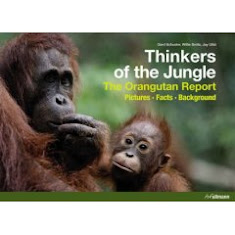





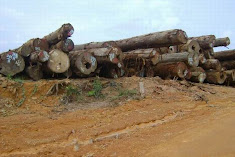
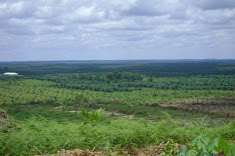












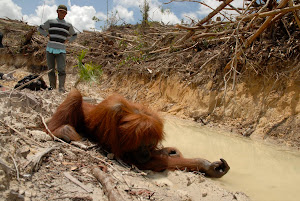
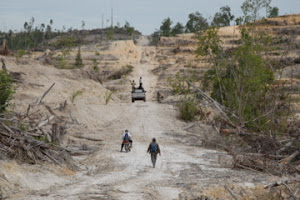
-a.jpg)
